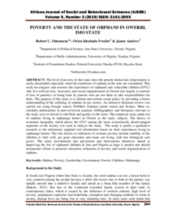ABSTRACT: The level of poverty in Imo state since the present democratic dispensation is easily discernable especially when the conditions of orphans in the state are considered. This study investigates and assesses the experiences of orphaned and vulnerable children (OVC) who live with poverty, insecurity and social stigmatization in Owerri due largely to reasons of loss of parent(s) or being born by parents who are not there to take responsibilities for them. The purpose of the study is to inform and reform social policy by providing a better understanding of the suffering of orphans in our society. An intensive literature review was carried out using Google search, PubMed, Scholars portal search and Scopus. More so, scholarly publications in peer-reviewed journals, bibliographies and literatures relevant to the study were reviewed to add flesh and quality to the study. The empirical study made use of orphans living in orphanage homes in Owerri as the study subjects. The theory of economic inequality which places the OVC among the most economically disadvantaged segments of the society was used to analyze the study. The study is purely a qualitative research as the informants supplied oral information based on their experiences living in orphanage homes. The risk factors or indicators of extreme poverty include inability of the children to feed well, get good education and many are living with non biological care givers. The study recommends that prevention and intervention initiatives aimed at improving the lots of orphaned children in Imo and Nigeria at large is needed and should incorporate efforts to promote education, reduction of poverty and social stigmatization of orphans.

